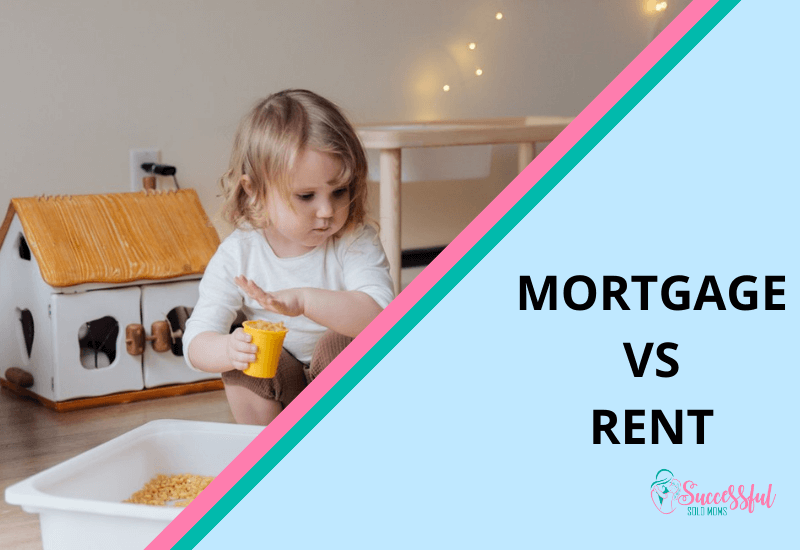
Buying -vs- Renting
Buying -vs- Renting, Owning -vs- Leasing, Mortgage -vs- Rent…However you phrase it, it’s a big and exciting choice! Before we go there though, I want to first congratulate you on kicking off your research to find the best living situation for you and your family! This will be an interesting journey and there’s a lot to uncover before you make your final decisions.
I once thought there was little difference in owning versus renting. However, now, after having done both pretty extensively, I understand there is a big difference in lifestyle.

Let’s start with similarities…
- You get to live in a place you can call “home”.
Whether you have funds to choose the home of your dreams or you feel limited on your choices, once you move in, this will be your home and you get to make choices to make it your cozy oasis. - A variety of home types are available to you.
Apartments are rented, and condos are owned, but so are townhomes, patio homes, and single-family houses. There are several options that will suit your needs. - You must abide by Community Rules.
No matter what type of living situation you choose, you must abide by the community rules, whether set by an Home Owner’s Association (HOA) or by an apartment company. You will receive a copy of the Rules and Restrictions prior to moving into the unit and will be required to sign your agreement. Read these carefully. This will impact how you will live life there. Rules and Restrictions could impact things like what kind of dog you may have or if you can have a guest park in the street in front of your house.
Personally, I believe that is the extent of the lifestyle similarities. The differences on the other hand seem endless.
- Time Commitment
For instance, buying a home tends to be more secure and more permanent, whereas renting may be a better choice if you are in a transition of any sort. If you plan to be in one location for approximately five years and plan to stay at your current job, then buying a home may be your best option. The time will allow for house appreciation, or increase in value, so that at the time of sale, you typically will make gains on your investment.
Of course, this depends on the market. Today, in 2022, the market is inflating significantly everywhere. Homeowners stand to make a pretty penny on selling but then they will turn around to pay those pretty pennies when they buy a new place (and renting requires more pennies right now!). Either way, if you are in transition…this could be stabilizing your finances, determining your career path, getting married or divorced, changing cities, or making other major life choices…renting may be your better path. This is primarily because as you work through your life change, you may discover new opinions and ideas about who you are and what you want. Renting is temporary and allows you to re-up your lease at the term limit or move on. It allows for directional shifts in your life to be accommodated.
- Designing your Space
Whether buying or renting, you get to call either scenario your home, but the extent you get to decorate and change and create uniqueness varies greatly in these options. In a rented space you may be allowed to paint, but you have to neutralize it or return it to its original state. You typically may hang things as long as you are willing to patch the holes before vacating. In an owned space, you make the rules. Move a wall, change the counter tops…paint, hang, plant…create as you see fit. So, if you want to be creative, then you may be better off buying, so you don’t have to undo your work at the end of term. - Care, Responsibilities, & Maintenance
For me, the level of responsibilities I had in my owned home struck me. When I rented and something broke, I got to call the landlord, wait a few days, and then things were fixed. However, with owning, I had to do the leg work and the payout for fixing things. This can be scary if you, like me, don’t know how AC units work or hate negotiating with insurance companies. I had to learn. I didn’t like it, but I learned. And there are benefits to this, which mainly is you are not at the mercy of the landlord and their opinions of what you need.
So, leaning one way or another yet? Let’s talk about the biggest factor in renting versus buying…finances.
Once again, a couple similarities between the two…
- No more than a Third.
It does not matter what a bank tells you can afford, your mortgage (including the tax, insurances, and interest) and your rent (including insurance) should not be more than one-third (1/3) of your monthly income. I cannot stress this enough. You can vary your other bills, turn off Netflix…not buy that steak or that bottle wine…but you cannot vary your housing payment. It must be on the lower end to save you plenty of budgeting space for all the other lifestyle choices. - Consequences of Real.
The consequences of not meeting your obligation, which are typically due on the first of the month, are severe. Eviction/foreclosure, ruining your credit, and an untimely move to a new location is nothing anyone wants to face. It’s important to make wise choices when picking your space.
But the differences…
- Pricing.
With renting, the cost does not typically change based on your credit score. It is possible to get denied if your income or credit score is too low, but they don’t typically outright change the price. With a mortgage, the higher your credit score, the better your interest rate. And the vice versa is true. Your minimum payment will go up if your credit score is low. - Upfront Costs.
With renting, you only need to pay moving costs and sometimes first and last months’ rent. However, with a mortgage you have the down payment (20% is best), agent fees, and closing costs that must be paid on the day of closing. - Return on Investment & Tax Benefit.
If you are seeking to earn some cash on your payments, then owning is the way to go. A timely sale of an appreciated home will earn an owner a few pretty pennies. Additionally, there is a tax write-off for the interest you paid on your mortgage. Not necessarily a huge benefit but is helpful. However, with renting, this is not an option for either of these. - Money for Maintenance.
If you choose to rent, you should not need to cover the costs of fixing the property or any appliance owned by the company or landlord. However, when owning, it’s a good idea to have a rainy-day fund just for that day when the expected occurs and you have to pay for repairs.
Let’s review!
Buying -vs- Renting Pros and Cons
RENTING with LEASE
BUYING with MORTGAGE
LIFESTYLE~~~~~~
~~~~~~~~~~~~~~~
~~~~~~~~~~~~~~~
A Home of Your Own
☑️
☑️
Various Types of Living Options
☑️
☑️
Community Rules to Live By
☑️
☑️
Time Commitment
1 year is standard, varying time frames can be negotiated
Generally, at least 5 years to allow for appreciation
Designing Your Space
Restricted
Within Parameters of Community Rules
Responsibilities & Maintenance
Covered by Company or Landlord
Covered by You
FINANICAL~~~~~
~~~~~~~~~~~~~~~
~~~~~~~~~~~~~~~
Budgeting 1/3 of Income
☑️
☑️
Consequences of Defaulting
Ruined credit and forceable move
Ruined credit and forceable move
Pricing
Not Impacted by Credit Score (though potential to be declined)
Interest Rate is impacted by Credit Score
Upfront Costs
Moving and Security Deposit
Moving, Closing Costs, Agent Fees, and Down Payment
Return on Investment
& Tax Credit
Not an option
High Probability
Money for Maintenance
Not your responsibility
Start saving!



